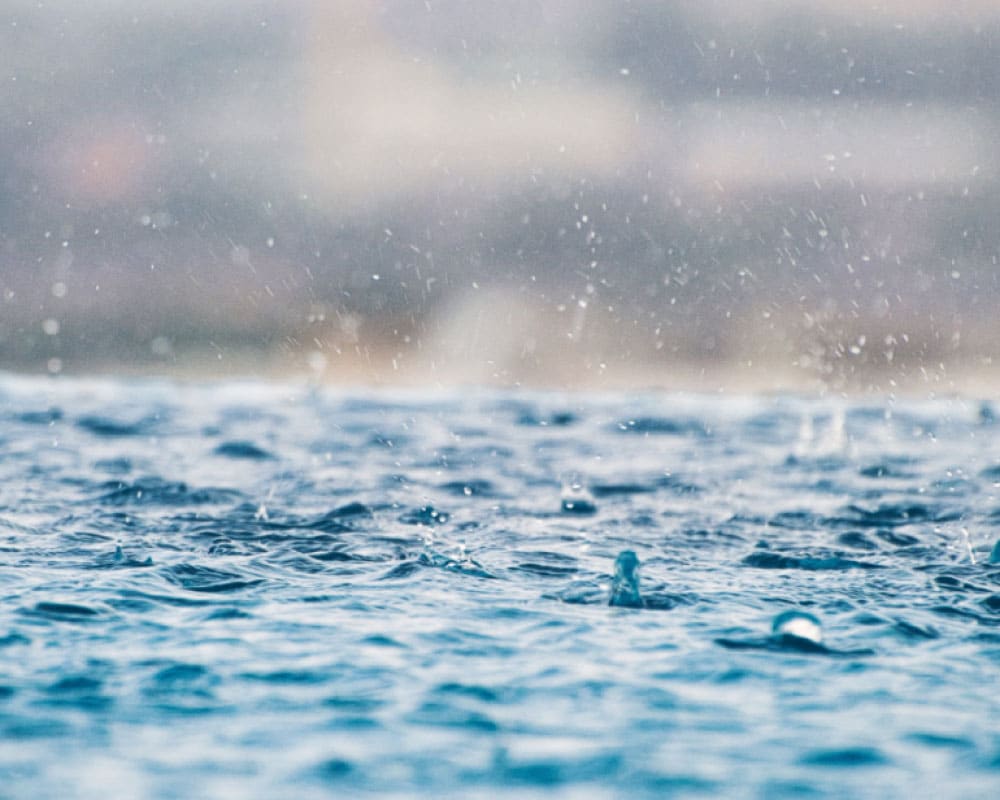Rainwater and seawater are two types of water that differ in their chemical composition and physical properties. Here are some key differences:
Chemical composition: Rainwater is essentially distilled water, meaning that it is almost pure H2O with a pH of around 5.6 due to the presence of dissolved carbon dioxide. On the other hand, seawater contains a wide range of dissolved salts and minerals, such as sodium chloride (table salt), magnesium, and calcium.
Salinity: The salinity of rainwater is very low, typically less than 0.1 parts per million (ppm). In contrast, the salinity of seawater is around 35,000 ppm.
Density: Seawater is denser than rainwater because of its higher salt content. The density of seawater is around 1.025 g/cm3, whereas the density of rainwater is around 1.00 g/cm3.

Uses: Rainwater can be used for drinking after it has been treated, whereas seawater is not suitable for drinking due to its high salt content. Seawater can be used for various industrial purposes, such as cooling and desalination.
Availability: Rainwater is a renewable resource that is constantly replenished by the water cycle, whereas seawater is a virtually inexhaustible resource, covering about 71% of the Earth’s surface.
In summary, rainwater and seawater are two different types of water with distinct properties and uses. While rainwater is essentially pure water with low salinity, seawater contains a variety of dissolved salts and minerals and is not suitable for drinking without desalination.
RO water (reverse osmosis water) is a type of purified water that is produced by removing impurities and contaminants from tap water using a filtration process known as reverse osmosis. This process involves forcing tap water through a semipermeable membrane that traps impurities and allows only pure water to pass through.
In terms of chemical composition and purity, RO water is similar to rainwater as both are essentially distilled water that has been stripped of most impurities. However, it is worth noting that some RO systems may also remove beneficial minerals from the water, such as calcium and magnesium, which can be important for human health.
In terms of salinity and density, RO water is similar to rainwater, as both have low salinity and a density of around 1.00 g/cm3.
Overall, in terms of chemical composition, RO water is similar to rainwater and both can be considered as pure sources of water. However, it’s important to note that RO water may have a different mineral content compared to rainwater, depending on the specific RO system used.
Using RO water for bathing and hair washing can have several advantages over using regular tap water:
Reduced mineral buildup: Regular tap water often contains minerals like calcium and magnesium, which can build up over time and leave a residue on hair and skin. This can make hair feel brittle and dry, and can also contribute to skin irritation. RO water, on the other hand, is stripped of these minerals and can help prevent buildup and residue.
Improved lathering: RO water can also improve the lathering and effectiveness of soaps and shampoos. This is because regular tap water can react with the ingredients in soaps and shampoos, leading to reduced lather and less effective cleaning. RO water, however, doesn’t react with these ingredients, leading to more lather and better cleaning.
Softer hair: RO water can make hair feel softer and smoother, as it doesn’t contain the minerals and impurities that can cause hair to feel rough and dry.
Reduced skin irritation: For people with sensitive skin, using RO water for bathing can help reduce irritation and inflammation. This is because regular tap water can contain chlorine and other chemicals that can be harsh on the skin, especially for those with sensitive skin.
Reduced exposure to contaminants: RO water is purified and free of many of the contaminants found in regular tap water, such as lead, pesticides, and bacteria. By using RO water for bathing and hair washing, you can reduce your exposure to these potentially harmful contaminants.
Overall, using RO water for bathing and hair washing can have several advantages, including reduced mineral buildup, improved lathering, softer hair, reduced skin irritation, and reduced exposure to contaminants.
